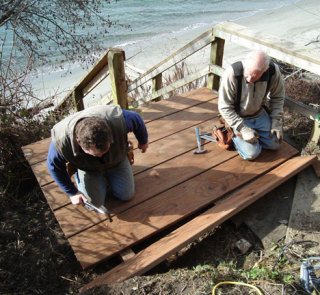FREELAND — It’s back to the beach at South Whidbey State Park north of Freeland, thanks to a few community volunteers who took tools in hand and fixed the stairs waylaid by a winter storm two years ago.
“It was silly not to have them open,” said Langley contractor Glenn Jones of the volunteer organization South Whidbey Home Builders. “We finally got everything in place.”
The stairway from a cliff to the beach at the popular recreation area along Admiralty Inlet has been closed since the upper section was destroyed by erosion during a storm in December 2006.
This past Saturday, Jones and four other volunteers, along with Park Rangers Jon Crimmins and Patty Anderson, used a pick-up truck load of lumber and other materials donated by Frontier Building Supply in Freeland to repair the damage.
Working with Jones on the project were builders Jim Thelen of Freeland and Dave Johnson of Clinton, along with Frontier manager Dion McCauley and his son, Connor, a Langley Middle School eighth-grader.
Crimmins said the repaired stairway will open officially when the campground opens on Sunday, March 15.
“It’s been sorely missed,” Crimmins said. “The campers will definitely be a lot happier.”
The park has 46 camping sites, including four hiker-biker areas, and all are in use throughout the summer, he said. The 3.5 miles of trails through the park also are a big draw.
The trail to the beach has always been a visitor favorite throughout the year, Crimmins said. The 357-acre park has 4,500 feet of saltwater shoreline on Admiralty Inlet and tidelands for crabbing and clamming.
The park attracts as many as 200,000 visitors, campers and day users each year, he said.
Park officials were hoping access to the beach could be reestablished last year, financed by an anticipated Federal Emergency Management Agency grant.
But the money was diverted to disaster relief in California, and the stairway remained closed.
Erosion of the blue clay in the area has always been a problem and will continue to be, Cummins predicted. Sections of the remaining stairs are crooked and totter in places.
Since the beach trail has been closed, warning signs have been posted and a larger sign has blocked access to the dangerous section of stairway. Still, some people climbed down to the beach, Crimmins said.
He said the repaired stairs should be adequate until a permanent solution can be found.
State parks officials envision a stair tower on the beach that would connect to the bluff with a skybridge, thus bypassing the erosion area.
But Crimmins said such a project could cost as much as $250,000, which is unlikely to be available to the park anytime soon given the state of the economy.
“The way the parks budget looks, I don’t see it being in there,” he said.
Jones said the decision to repair the stairs was a “barn-raising kind of thing,” and he expects to see an increase in similar activity during the current fiscal upheaval.
“It’s necessary for a community to support its own resources,” he said. “I think that’s a good thing, a good change. Instead of waiting for a big purse of money, we should sacrifice and do it ourselves.”
Meanwhile, he added, “I hope people go down the stairs and enjoy the beach.”



